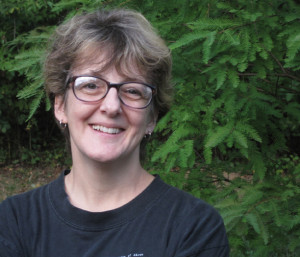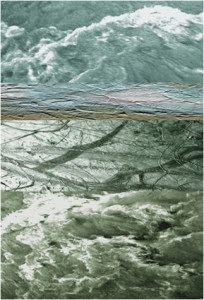Laura Grace Weldon: I found myself forgetting to inhale as I read your powerfully layered poem, “Breathing Without Air” in the July issue of r.kv.r.y.. Can you tell us a little about what inspired this work?
Leslie Nielsen: Thank you! I’m delighted that you were affected in any way at all. I’m also delighted to finally have a story like this to tell. This poem was originally an exercise for an MFA class, but the lovely Ruth Schwartz persuaded me that it worked as a poem—better, in fact, than many of the efforts I’d been declaring to be finished poems. [wry LOL] “Finishing” for me always seems to run the risk of overworked, over-tidy language sanded down to a continuous, inoffensive surface. What Ruth saw, I think, was what she and I began to call “leapiness” which is way more interesting.
Breathing has always been a big deal for me. For who is it not, I know, but as a kid I had such bad allergies. Swimming lessons were a trauma because it was miserably uncomfortable to put my sinus-clogged face into the water’s pressure. Blowing bubbles out of my stuffy nose just wasn’t an option. Despite that, I was in the barn and field all day every day, covered with animal dander and pollens. When my kids have had the sniffles or infrequent bone-rattling asthmatic coughs, I can only imagine what my mom and dad listened to my entire childhood. And then, I don’t know how often this happens to others, but I’ve managed to swallow wrong really badly something like once every other year, and have given myself some serious scares.
I was doing a writing exercise I’ve assigned many times, to take whatever is at hand and begin writing. What I grabbed was a plastic bag with all its consumer protection warnings. This merged with suffocation anxiety—first the respiratory kind, then the emotional kind—when the securities believed to be essential to life are removed, but somehow life has not ended, and this poem formed.
LGW: You are a parent, scholar, teacher, editor, writer, gardener, seamstress, photographer, musician, and much more. How do these roles impact your writerly life?
LN: Your list makes my scattered attention span sound very impressive. Part of me growing me up as a writer has been to accept the actual circumstances of my life as being worth writing about. It took a while to get over a sense I had that all good stories happened in New York and all interesting insights happened in celebrated places. When I started teaching creative writing, I discovered that most young writers have to go through this departure from and reunion with the self. The general is never interesting, the precise is. Particular, not stereotype. But it’s hard to do, hard to attune the ears and eyes to nuance and understatement and precision when there are so many cool ideas to share. I have some favorite quotes, but now I can’t remember if they’re from B.B. King or Niels Henning Ørsted Pedersen: “You don’t shout every time you say something,” and “It’s music, not gymnastics.” I think those apply to any art form. So, to come back to your question, the hands-on work (sewing and gardening and drawing and piano practice as examples) not the utterly cerebral work (like writing and teaching) schools the body and brain in detail, in process, in the passage of real time. It’s lived physics. Without the body, the physical, in the writing, it (the writing) just floats off and can’t hold anyone’s attention.
LGW: Moving from Ohio to Denmark, do you notice changing reference points of self and culture in your writing?
LN: If I’d moved earlier in life, they might have changed more—like the way I got new hair, new friends, and a new sense of identity with my new classes and books each semester at university. What I’m finding here and now, though, is that I’m getting additional vantage points for seeing the same reference points that have mattered to me over and over: language, gender, spirituality, creative ability and output. Instead of noticing change, which of course must be ongoing during this linguistic and cultural shift, I’m really noticing the things that persist.
LGW: There may be no other poem written that uses plastic bag so uniquely, from “all you’ve got” to “safari net” to “noose” to “way to survive.” From suffocation to awareness. You have a remarkable ability to connect incongruities. Can you talk with us about how to make this work in a poem?
LN: Yeah—that’s exactly the leapiness principle! I think I tried to keep circling back to just those moments when panic is ready to set in, but instead something like Emily Dickinson’s “formal feeling” comes. Wow. In fact, this poem, now that I look at it next to Dickinson follows the same contour, so my survival is a lot like her “letting go.” Not deliberate mimicry, but I have always loved that poem, so how cool to have its flow seeping into a piece of my own work.
LGW: You touch again on the theme of breath and memory, although in an entirely different way, in your evocative poem “Walking,” recently published in The Missing Slate. One poem is first person, the other second person. Can you talk with us about writing from these different narrative angles and how you choose?
LN: Somewhere back in the genesis of each poem, there’s a real experience and a real intended hearer. In “Walking,” it’s my husband and our experience together of birthing our daughters. In “Breathing Without Air” it’s a person in a hospital waiting room while someone dear is in crisis and in the hands of others and words are inadequate comfort. The birthing transmogrified entirely to metaphor keeping, I hope, the intimacy, but the waiting room scene hung around literally.
I’ve deliberately switched POV back and forth in my fiction writing to try for different effects, but seem to settle and stick early on with poems.
LGW: I read a quote recently that said, “What you do when you procrastinate should be your life’s work.” Care to share with us what your preferred procrastination work tends to be?
LN: Um—maybe I should be a hotel maid again. I loved that work. Whenever I’m facing a deadline, the homeplace is utterly clean and neat—sparkling dishes, smooth beds, speck-free floors. I don’t know why I do it, because when it’s done, I’m out of excuses to avoid the work, and sometimes out of time for making the deadline. It’s like eating all the chocolate so I’m not tempted to eat the chocolate.
LGW: Take us into your world for a moment. What have you been reading lately? What do you see around you right now? What lightens your spirit?
LN: Oh. Dealing with this might have a bit of a shadow to it—an absence that is a presence. I’m now one year into having stepped away from academia and teaching, but the weight of mounds of student work to comment on or grade still feels newly removed, so I still experience it as a lightness. On the more obviously affirming side, I’m crazy free to pursue creative work. My paintbrushes and colored pencils are out on the desk, there’s a novel draft and stack of proto-poems next to them, and the wind is always blowing here. Blowing fresh.
Laura Grace Weldon lives on Bit of Earth Farm where she’s an editorand marginally useful farm wench. She’s the author of a poetry collection titled Tending and a handbook of alternative education, Free Range Learning. Her work appears in such places as Christian Science Monitor, J Journal, Literary Mama, The Shine Journal, Red River Review, Dressing Room Poetry Journal, Shot Glass Journal, Rose & Thorn Journal, Iodine Poetry Journal, and Pudding House. Connect with her at lauragraceweldon.com



Pingback: Breathing Without Air | Rkvry Quarterly Literary Journal